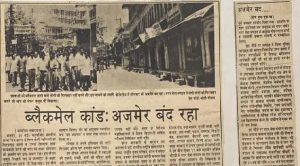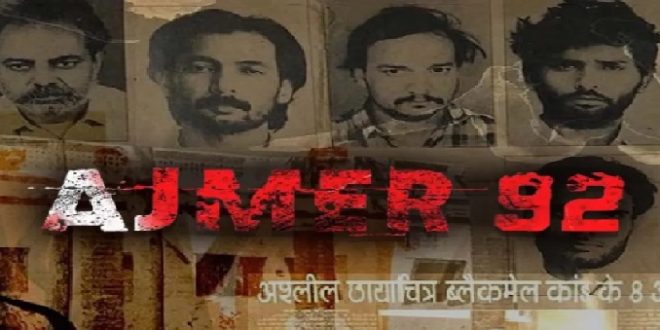31-08-2024
Bureau Report + Agencies
NEW DELHI: “My heart is filled with so much pain. Even today, I cry when I think about how that one encounter destroyed my life.”
The year was 1992. Sushma* said she was 18 when a man she knew took her to an abandoned warehouse under the pretext of watching video tapes. There, six to seven men tied her up, raped her and took photographs of the act.
 The men belonged to rich, influential families in Ajmer, a city in the western Indian state of Rajasthan.
The men belonged to rich, influential families in Ajmer, a city in the western Indian state of Rajasthan.
“After they raped me, one of them gave me 200 rupees ($2; £1) to buy lipstick. I didn’t take the money,” she said.
Last week, 32 years later, Sushma saw a court convict her rapists and sentence them to life imprisonment.
“I am 50 years old today and I finally feel like I got justice,” she said but “it cannot bring back all that I have lost.”
She said she had endured years of slander and taunts from society because of what happened to her, and both her marriages ended in divorce when her husbands discovered her past.
Sushma is one of 16 victims all schoolchildren or students who were raped and blackmailed by a group of powerful men in different places in Ajmer city over several months in 1992. The case became a massive scandal and sparked huge protests.
Last week, the court handed out life sentences to six of the 18 accused: Nafis Chishty, Iqbal Bhat, Saleem Chishty, Sayed Jamir Hussain, Naseem also known as Tarzan and Suhail Ghani.
They have not confessed to the crime and their lawyers said they will appeal the verdict in a higher court.
So what happened to the remaining 12 accused?
Eight were sentenced to life in 1998, but four were acquitted by a higher court, and the others had their sentences reduced to 10 years.
 Of the remaining four, one died by suicide. Another was sentenced to life in 2007 but was acquitted six years later. One was convicted in a related minor case but later acquitted, and one of the accused is still absconding.
Of the remaining four, one died by suicide. Another was sentenced to life in 2007 but was acquitted six years later. One was convicted in a related minor case but later acquitted, and one of the accused is still absconding.
“Can you even call this (the 20 August verdict) justice? A judgement is not justice,” said Santosh Gupta, a journalist who had written about the case and has appeared as a witness for the prosecution.
It is a thought echoed by Supreme Court lawyer Rebecca John, who called it yet another case of “justice delayed is justice denied”.
“This points to a problem that extends far beyond the legal system. Our patriarchal society is broken. What we need is a mindset change, but how long is that going to take?” The accused men used their power and influence to deceive, threaten and lure their victims, said prosecution lawyer Virendra Singh Rathore.
They took compromising photographs and videos of their victims and used them to blackmail them into silence or bring in more victims, he added.
“In one instance, the accused invited a man they knew to a party and got him drunk. They took compromising photos of him and threatened to make them public if he didn’t bring his female friends to meet them,” he said. “That’s how they kept getting victims.” The accused also had strong political and social connections. Some of them were associated with a famous dargah (Muslim religious shrine) in the city.
“They roamed around on bikes and cars in what was a small-town city at the time,” Gupta said. “Some people were afraid of these men, some wanted to get closer to them and some wanted to be like them.”
 Pressmediaofindia
Pressmediaofindia




